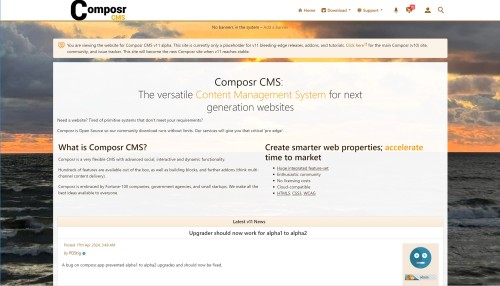Featured Sites: A-Z Index
H
Newest 10 Entries
| Website | PDStig, LLC |
|---|---|
| Screenshot |  |
| Short Description | This is an informational site / portfolio for PDStig, LLC, the company run by one of Composr's lead developers, Patrick Schmalstig. |
| Website | Composr CMS: Your Data, Your Privacy, Your Control - Composr CMS: Your Data, Your Privacy, Your Control |
|---|---|
| Screenshot |  |
| Short Description | This is the main website for Composr CMS version 11. It runs the latest build of v11. Currently it is just a placeholder but will soon replace compo.sr when v11 becomes stable. |
| Question | Should I use the bleeding edge releases or the git repository? | ||||||||||||||
|---|---|---|---|---|---|---|---|---|---|---|---|---|---|---|---|
| Answer | That depends on several factors. Here are some pros and cons of each:
Click here to access the git repository. |
| Question | Can I switch a v11 install from git over to using the releases from composr.app? |
|---|---|
| Answer | It is not recommended you do this because you may run into issues. For example, some changes were made in crypto_master.php and data/upgrader2.php prior to the first v11 alpha. These changes will result in a broken upgrade unless you already pulled these changes from git. Similar situations could happen in the future as well. It is recommended you either discard the git install and use a fresh install from the Downloads, or to maintain a git install and a bleeding-edge release install separately. Do not combine the two. |
| Question | Should I update my non-bundled addons after updating to a newer release of version 11? |
|---|---|
| Answer | Absolutely! Frequent changes may be made to both bundled and non-bundled addons. Bundled addons will be updated via the upgrader. For non-bundled addons, you will have to update them through the addons management screen (Admin Zone > Structure > Addons). You will be informed which ones need updated. Once version 11 reaches release candidate, we do not expect frequent updates to non-bundled addons anymore. But it is still good practice to check after every update. |
| Question | Can I upgrade a version 10 site to version 11? |
|---|---|
| Answer | Yes, for basic non-custom v10 sites. However, expect some issues to arise in the process. And please report those issues to the tracker. For v10 sites with non-bundled addons or customisations, upgrading to v11 will likely break the site until you update the non-bundled addons or temporarily remove the customisations. We aim to have the upgrader fully functional for a large majority of types of sites and for sites using non-bundled addons by the time version 11 reaches release candidate stage. We do not recommend upgrading production v10 sites at this time until v11 reaches stable. |
| Question | Can I upgrade a previous version 11 release to a newer one using the upgrader? |
|---|---|
| Answer | Yes (probably). Always remember especially during alpha and beta phases that things can break. Please make backups first. And let us know on the issue tracker if an issue occurs. Note: You cannot upgrade from 11 alpha to 11 beta without first upgrading to 11.alpha4 (if you are not already on 11.alpha4). |
| Question | What are the current release plans for version 11? |
|---|---|
| Answer | As of July 22, 2024, we entered beta status where our focus is now smashing bugs and stabilising the software. All planned features have been implemented for 11.0 (and most others deferred to 11.1 or later), though we may still merge in a few minor features or tweaks. The upgrader has been tested on a typical non-custom v10 site. We will be releasing several beta versions in the beta phase. We do not know when we will be able to release the first Release Candidate or stable versions at this time. These plans are all subject to change without notice. |
| Question | Why is there a separate website for version 11? |
|---|---|
| Answer | That is explained in detail in this news article on compo.sr including the migration plans and implications. |
Top 10 Entries
| Question | How are time zones handled in Composr statistics? |
|---|---|
| Answer | All times in Composr statistics are displayed according to the configured website time zone, regardless of visitor or user account time zones. While this is a limitation due to pre-computation, some graphs displaying hourly stats and country filtering offer insights into local times for manual analysis. |
| Question | What are the limitations of pre-computed statistics in Composr? |
|---|---|
| Answer | Pre-computed statistics introduce certain limitations:
|
| Question | Why does Composr use pre-computed statistics? |
|---|---|
| Answer | Composr generates statistics from pre-computed data for several reasons:
|
| Question | What are KPIs and how are they used in Composr? |
|---|---|
| Answer | KPIs (Key Performance Indicators) are specific measurements selected for marketing analysis. In Composr, time-series graphs can be added as KPIs. They offer several benefits:
|
| Question | How can I perform split testing in Composr? |
|---|---|
| Answer | Split testing in Composr involves combining tracking codes with events. The simplest approach utilizes Tempcode:
|
| Question | What is the purpose of tracking codes in Composr? |
|---|---|
| Answer | Tracking codes help you identify the sources driving user sessions to your website or associate specific split testing variations with users. Composr offers integrated referral tracking through various means:
|
| Question | What are the different ways to track events in Composr? |
|---|---|
| Answer | Composr offers various methods for tracking events:
The JavaScript and HTML data attribute methods can also be integrated with Google Analytics events. |
| Question | How do I install geo-location data for Composr statistics? |
|---|---|
| Answer | Geo-location data installation is usually automatic during the Composr installation process. If not, you can manually install it by navigating to Admin Zone > Audit > Site statistics > Install geolocation data. This action will reschedule the installation task. If you don't see this option, the geo-location data is already installed. |
| Question | What are the key differences between Google Analytics and Composr statistics? |
|---|---|
| Answer | While there is some overlap, Composr statistics and Google Analytics are complementary tools. Google Analytics Pros:
Google Analytics Cons:
Composr Statistics Pros:
Basic users may find Composr statistics sufficient, while expert marketers might prefer the power of Google Analytics. |
| Question | What tools and strategies can be used for staff training and development? |
|---|---|
| Answer | While Composr itself doesn't provide built-in training features, several approaches can be used for staff development:
By investing in ongoing staff training and development, communities can ensure their teams possess the necessary knowledge and skills to perform their roles effectively and contribute to the platform's overall success. |





